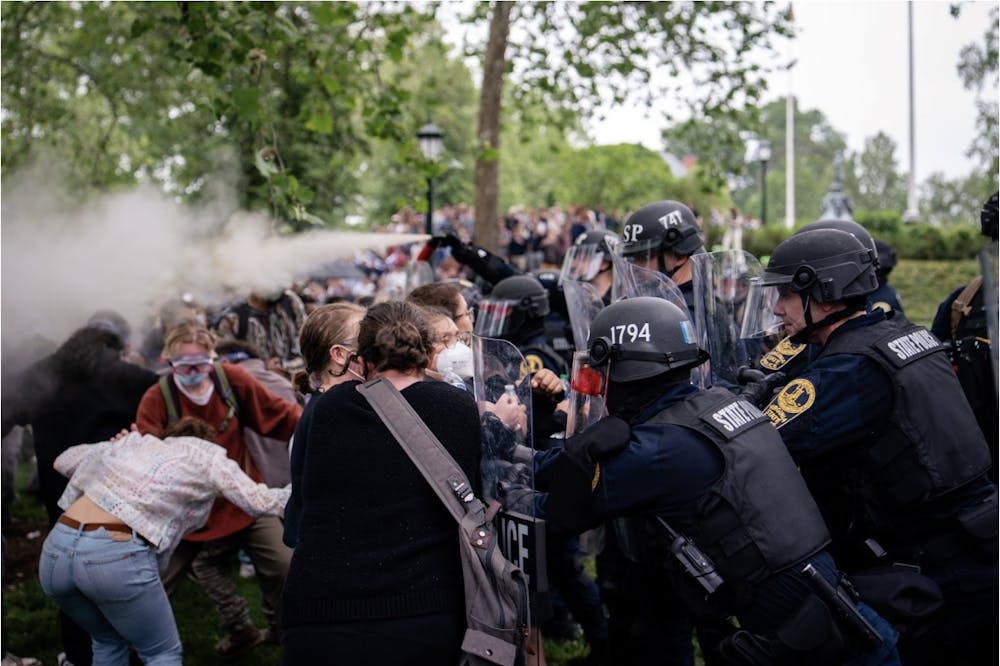In the last month, many universities have made the news for using police to break up pro-Palestine encampments. The University joined this list May 4 when it sent state police in riot gear to dismantle what had been a days-long, non-disruptive encampment. In President Jim Ryan’s update that same day, he claimed the police action was a “neutral and even-handed enforcement of [the] rules.” To some, that argument might sound great and good, but as anyone who has watched a U.Va.-Virginia Tech basketball game can tell you, this is simplistic at best. In reality, rules are contextual, and enforcement is selective, so the policies that the University chooses to enforce say a lot about what and who it values.
It would be naive to assume that every rule is administered equally. For example, the University’s policies disallow the use of alcohol in public or common areas. This may come as a surprise to anyone who often walks past the Mad Bowl or the Lawn, where you can regularly see jovial students drinking openly with impunity. Are riot police sicced upon these day-drinking delinquents? Of course not, even when they leave the place trashed the day after.
And then there is, of course, the beloved tradition of streaking across the Lawn. This is blatantly illegal, and in many states, it would land you on a sex offender registry. But we all know there are no such repercussions for this behavior on Grounds. The University’s own police department has said as much!
So why are some rules enforced while others fall, consciously or unconsciously, by the wayside? It happens because the University does not enforce policies blindly, it decides whether the harms outweigh the benefits. The administration lets students drink openly because it thinks the harms are minimal, and sending cops to arrest drunk college students is more likely to get someone hurt than helped. Following this logic, when Ryan called state police to Grounds, he presumably did so thinking the protest was sufficiently dangerous to warrant the extreme response.
But was it? Ryan says the protestors violated policies that “secure the safety, operations, and rights of the entire University community.” These are lofty words to describe the line that was crossed — tents. The protestors had been left alone in the days prior, but when it began raining Friday evening, they pitched tents to stay dry. Their refusal to dismantle those tents Saturday morning launched this whole series of events. No one can seriously claim the mere presence of tents is dangerous. There are tents on Grounds all the time — by the sports fields, during tailgates and even in the amphitheater. In fact, the EHS guidelines stated until hours before the breakup that tents were allowed for recreational purposes without a permit.
Clearly, the tents are not the problem, so maybe it was the people occupying them? No. By all accounts, the encampment was effectively a perpetual 20-person picnic before the police showed up. Ryan initially claimed that students attempted to assault University Police, but those charges were dropped after consulting with the officers involved, and video evidence makes clear why. Much hay has been made since about four outside agitators that police feared would escalate matters, but this level of response over four still-unnamed people seems absurd.
The only remaining justification is that it was not the policy itself, but fear of the protest’s escalation that spurred the response. But even this is unjustifiable. Not to disparage the commitment of the protestors, but before May 4 their numbers were small and waning. So if the University was attempting to prevent the situation from escalating, their actions did little besides cause the very thing they sought to prevent.
Only one explanation remains, this sudden and abrasive maneuver can only be explained by the administration’s personal discomfort with the protest — be it over the aesthetics, message or tone, all of which are protected free speech. This same feeling of comfort is likely the true reason behind every policy’s selective enforcement. In short, those in power are not made uncomfortable by students who break public intoxication and streaking rules, but they are by students protesting Israeli war crimes.
While the downsides of allowing the protest to continue are murky, the harms of breaking it up are crystal clear. To do so silences the free speech of the protestors, which undermines the stated goals of the University. Moreover, to do it in the way the administration did, by bringing in antagonistic state police with dangerous weapons, puts student safety at tangible risk. Onlookers and journalists were pepper sprayed, the riot line pushed students out onto University Avenue and, despite claims by Timothy Longo — chief of the University Police Department and vice president for security and safety, — the medical treatment available came in the form of water bottles various students had distributed to flush pepper spray out of their eyes. The calculus in this decision is clear – the violence state police used to enforce the policy created significantly more danger to the community than the violation of the policy itself.
Ryan’s statement hopes to convince people that the University had no choice — students broke the rules, he had to enforce them. But this is patently false. It would imply that the University determined that student safety, free speech and its own image are all less important than the perceived harm of a couple of tents keeping protestors out of the rain for a few days. The reality is much simpler. Anyone who has watched a U.Va.-Virginia Tech game can tell you — a questionable call is ok as long as it is against the other team.
Mo Van de Sompel is a doctoral student in Economics at the University. He can be reached at opinion@cavalierdaily.com.
The opinions expressed in this column are not necessarily those of The Cavalier Daily. Columns represent the views of the author alone.







